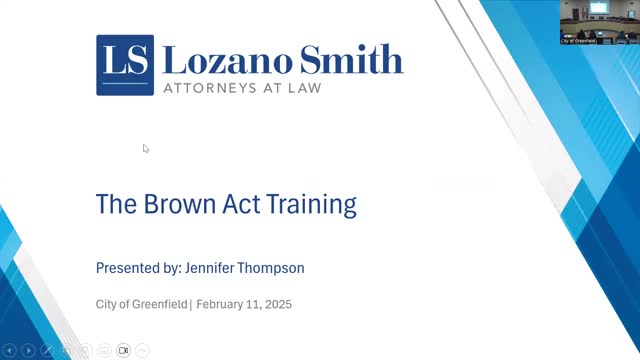City attorney-led Brown Act training reviewed meeting rules, teleconferencing and social media limits
Get AI-powered insights, summaries, and transcripts
Subscribe
Summary
A two-hour Brown Act training given to the City of Greenfield council and planning commission reviewed open-meeting requirements, teleconferencing exceptions, social-media guidance and penalties for violations, with staff and commissioners asking questions about field trips, serial communications and reasonable accommodations.
Jennifer, a presenting counsel who led the Brown Act session, told the City of Greenfield City Council and Planning Commission that the Brown Act "says that actions and deliberations be taken openly and in public," and she outlined how the law shapes posting, public comment and closed sessions.
The training summarized key rules and local practices the body must follow. Jennifer said regular meeting agendas must be posted 72 hours before a meeting (24 hours for special meetings) and described the law's definition of a meeting as "any congregation of a majority of members at the same time and location to hear, discuss, or deliberate on any item within the public agency's jurisdiction." She emphasized that "you don't have to actually make a decision for it to be a meeting" — mere discussion can trigger Brown Act obligations.
Why it matters: The Brown Act governs how Greenfield's elected and appointed bodies may communicate and decide public business. Violations can lead to nullification of actions, court-ordered remedies and, in some cases, criminal penalties. The session highlighted practical areas that have caused uncertainty for local officials: serial or "chain" communications, social media interactions, teleconferencing rules that changed since COVID, public comment protocols and proper use of closed sessions.
Notable clarifications and audience questions
- Serial communications and “hub-and-spoke” chains: Jennifer explained that a series of one-on-one or hub-mediated messages that, taken together, involve a majority of a body can amount to an unlawful serial meeting. She advised officials to avoid reply-all email threads that reveal colleagues’ positions.
- Social media: Jennifer described a newer statutory development: likes or comments on social-media posts can, in some situations, be treated as Brown Act communications. She cautioned that, if a post concerns a matter within the body's jurisdiction, interactions can create impermissible deliberations even if only two members are involved.
- Teleconferencing: The presenter reviewed standard teleconference rules (posting the remote location on the agenda, open public access at that location) and newer options created after COVID. She summarized available exceptions — declared state-of-emergency, "just cause" (childcare, caregiving, contagious illness, disability, or official travel) and emergency circumstances — and noted limits on how often some exceptions can be used per year. She also noted a recent attorney-general opinion allowing long-term remote attendance as a reasonable accommodation for disability, but said the opinion has not been reconciled fully with Brown Act mechanics.
- Public comment and decorum: Jennifer explained the interplay between First Amendment protections and meeting decorum: members of the public may speak and record, but they cannot disrupt the meeting or speak outside established public-comment times. She described a de-escalation sequence (warning, brief recess, clearing room) that can be used when an audience member is disruptive.
- Closed sessions and confidentiality: The training covered permissible closed-session topics — negotiations on real property, pending litigation, certain personnel matters, labor negotiations, limited public-safety and cybersecurity discussions — and stressed that disclosure of closed-session content is a Brown Act violation and can have legal consequences.
What the council asked and the presenter’s practical advice
Council members asked whether attending conferences or facility tours (for example, a cannabis facility tour attended by three commissioners) could create violations; Jennifer said such attendance can be a violation if the subject matter falls within the body's jurisdiction and the gathering effectively results in collective discussion outside a public meeting. Commissioners asked about voting while teleconferencing; Jennifer said some teleconferencing modes require on-camera roll-call votes or two-way communication and that the majority of the body still must be physically present for many remote-attendance options.
Ending
Jennifer offered to provide her slides and said staff could follow up with written references. The training concluded with an invitation to contact counsel for clarifications before taking actions that might implicate the Brown Act.
